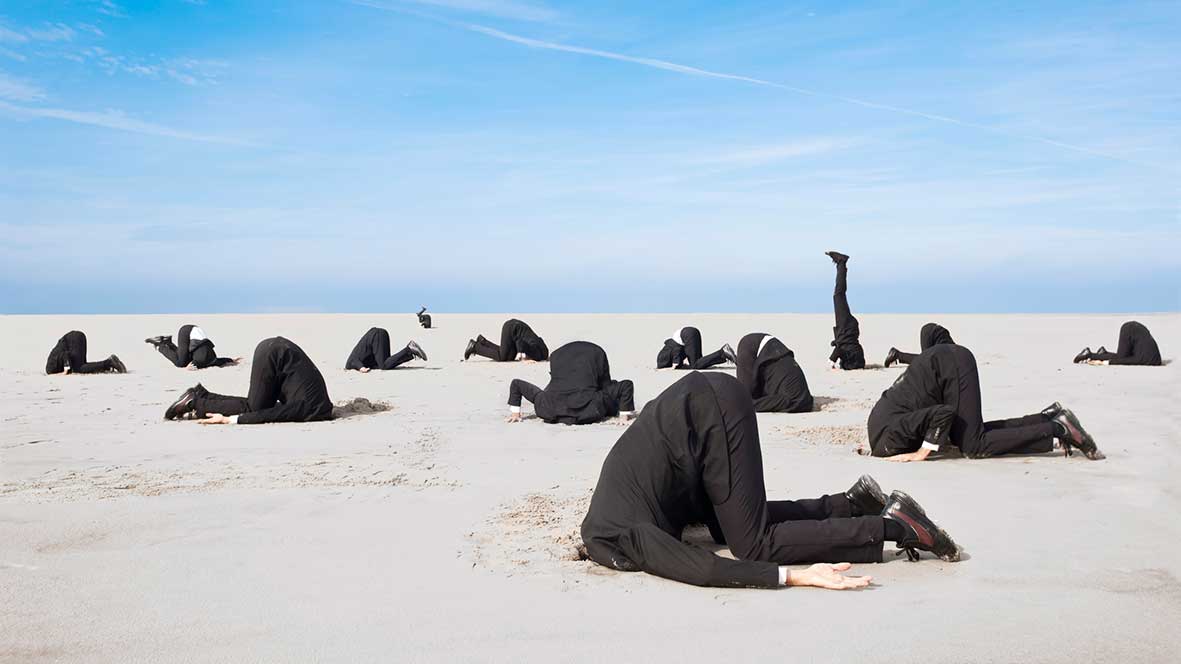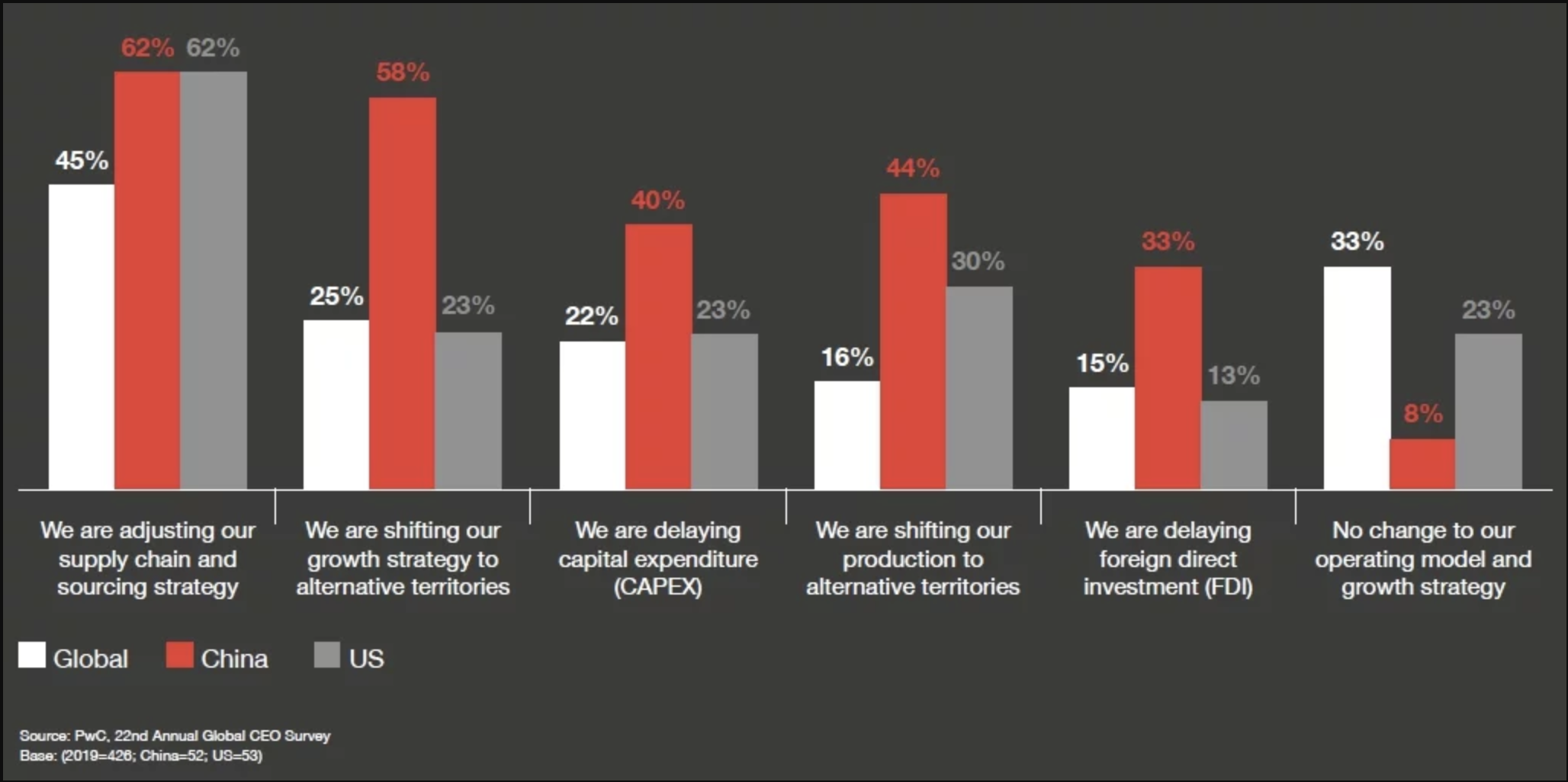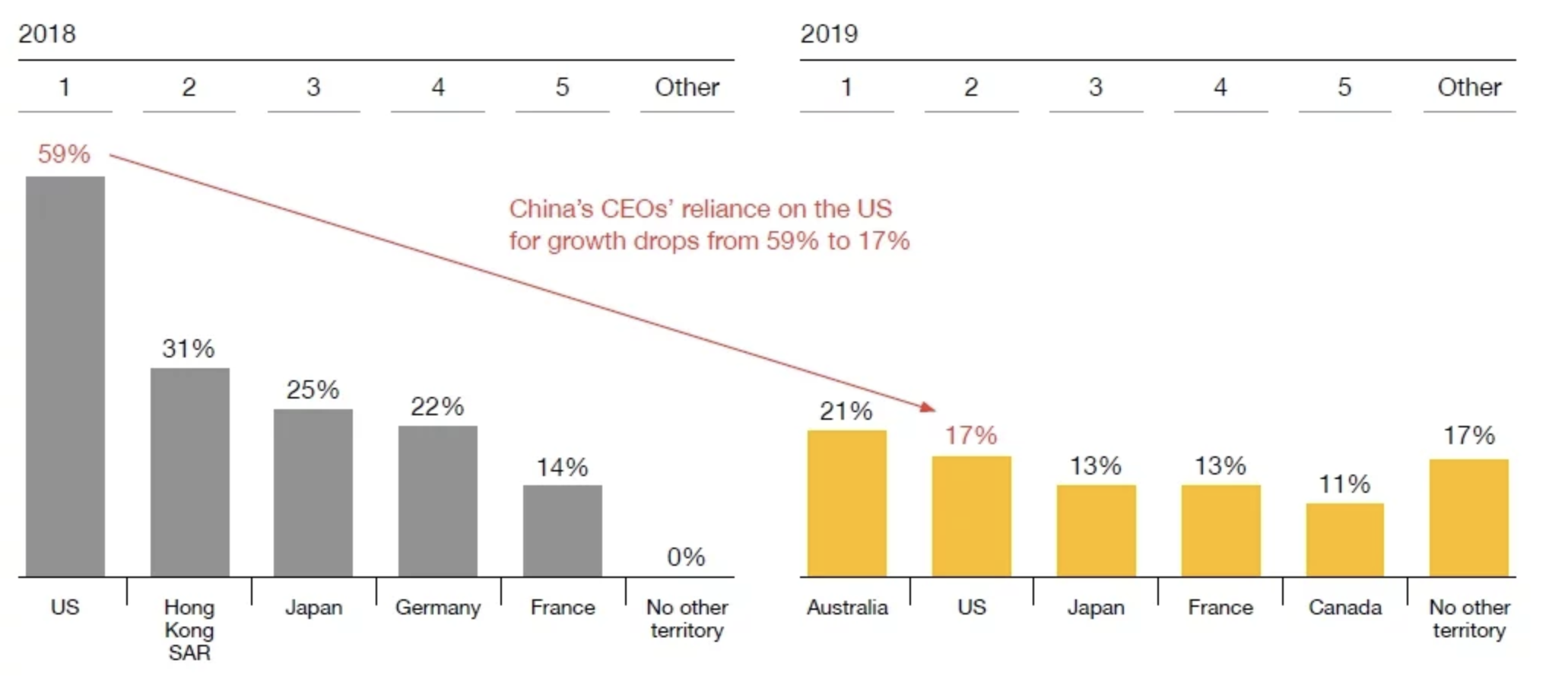Aussie CEOs have their heads in the sand over trade wars

The world’s most authoritative survey of global chief executives has found Australian business leaders are particularly worried about the impact of global trade wars — but they also say they’re not doing much about it.
Exactly zero per cent of Australian company leaders surveyed in the PricewaterhouseCoopers annual CEO survey said they were making any adjustments to their supply chain strategies, even though 61 per cent said they were “concerned” or “extremely concerned” about the impact of trade wars on their organisation’s growth.
The PwC annual CEO survey, released overnight at the World Economic Forum summit in Davos, involved 3,200 interviews across 91 countries, with responses from 1,378 CEOs. There were 131 Australian CEOs surveyed.
While none of the Australian executives said they were changing their supply chain strategy, that number was 45 per cent at the global level.
Almost two-thirds — 63 per cent — of Australian CEOs said there would be no change to their operating model and growth strategy, compared to just 33 per cent globally.
Let’s recap that:
- Australian CEOs making changes to their supply chain strategy as a result: 0 per cent
- Global CEOs making changes by comparison: 45 per cent
- Australian CEOs who say there will be no change to their operating model as a result of trade wars: 63 per cent
- Global CEOs who say there will be no change to their operating model as a result of trade wars: 33
The chart below shows what CEOs around the world are going in response to the deteriorating global trade outlook:

PwC Australia CEO Luke Sayers noted a “lack of action from business leaders to minimise the potential impact of trade conflicts on their organisation’s growth”.
The chief economist at PwC Australia, Jeremy Thorpe, told Business Insider that Australian companies had “not shown a willingness to be proactive in growing and thinking about Asia.
“It’s therefore not surprising that they’ve been slow to see that there might be opportunities or the potential to reduce negative consequences. They are being cautious but not necessarily prudent in exploring different ways of obtaining goods and services or selling goods and services in a new trade environment.”
The US and China are currently in talks to try and resolve their bilateral trade tensions, which have seen the imposition of tariffs on imports worth hundreds of billions of dollars on goods traded between the world’s two largest economies.
China’s rate of economic growth is slowing down. Data released yesterday showed China’s GDP growth slowed to 6.4per cent, the slowest in almost a decade.
Australia’s economic fortunes are closely linked to Chinese economic activity. China is by far Australia’s largest trading partner, accounting for almost one-third of all of Australia’s trade.
In a stunning example of how directly Chinese policy can affect the fortunes of Australian firms, shares listed recycling firm Sims Metal plunged more than 15 per cent yesterday after it warned of lower earnings due to slow Chinese demand.
One significant positive for Australian companies, however, is that Chinese CEOs now cite Australia as their top target market for growth – ahead of the US.

Sayers said the report showed global business leaders were “adjusting their strategies to seek out their most opportunistic path for growth” in a changing world.
“This is not the case in Australia though, with a lack of action from business leaders to minimise the potential impact of trade conflicts on their organisation’s growth, or better yet, to seek out strategic opportunities,” Sayer said.
“Australia might not be in the firing line, but that doesn’t mean we should be sitting on the sidelines and not thinking about how we could be impacted, either positively or negatively.”
In a note accompanying the release of the report, PwC global chairman Bob Moritz said: “The prevailing sentiment this year is one of caution in the face of increasing uncertainty. CEOs all around the world are less optimistic than they were a year ago about the strength of the global economy and their own organisations’ ability to grow revenues in both the short and medium term.”
He added: “CEOs are less bothered by the broad, existential threats that figured prominently in the rankings last year, like terrorism and climate change, and are more ‘extremely concerned’ about factors that affect the ease of doing business in the markets where they operate and those that impact their overall confidence and willingness to invest and/or take risk.”
The survey showed a record increase in pessimism on growth prospects in the survey, which in the past, PwC says, has proven to be a reliable leading indicator of global economic growth.
Other key survey findings from the Australian chief executives include:
- 32 per cent are projecting a decline in global GDP growth this year
- 95 per cent say customer data is key to their future success, but only 7 per cent say their current data is comprehensive
- An overwhelming majority – 86 per cent — accept that artificial intelligence (AI) will significantly change the way they do business in the next 5 years yet only 29 per cent have plans to start producing AI initiatives.
This article first appeared on Business Insider Australia, Australia’s most popular business news website. Follow Business Insider on Facebook or Twitter.
UNLOCK INSIGHTS
Discover the untold stories of emerging ASX stocks.
Daily news and expert analysis, it's free to subscribe.
By proceeding, you confirm you understand that we handle personal information in accordance with our Privacy Policy.








